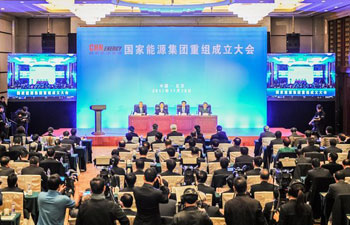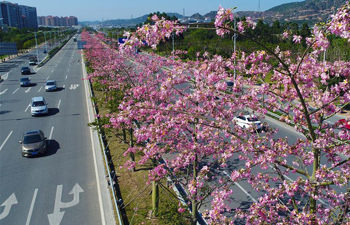BEIJING, Nov. 29 (Xinhua) -- Che Xueqiao is in charge of six public toilets in Beijing's Fengtai District, making sure people's visits there are free of unpleasant smells and other discomforts.
Two of the toilets were built last year, while the rest were transformed from traditional dry toilets, basically an open pit.
"Inspectors check the toilets every day, so I work hard to keep them clean," said Che.
Che's job is part of a national "toilet revolution."
In 2015, a three-year campaign to increase the number and sanitation of toilets at tourist sites began. The campaign expanded to improve public toilets in cities and build better private toilets in rural areas.
As of the end of October, over 20 billion yuan (about 3 billion U.S. dollars) had been spent in installing or renovating 68,000 toilets at tourist sites, exceeding the original target of 57,000 toilets.
In a recent instruction on the achievement of toilet revolution carried out in the tourism sector, President Xi Jinping said the construction of clean toilets is an important part of pushing urban and rural civilization, and more efforts should be made in both cities and rural areas to upgrade toilets.
At the 19th National Congress of the Communist Party of China, the Party promised to make rural areas "pleasant living environments".
The toilet revolution aims to equip rural homes with "sanitary" toilets of at least two square meters with walls, roofs, doors and windows. They may be flush toilets or dry toilets with underground storage tanks.
Toilets in China's countryside have long been an issue. Some are little more than ramshackle shelters surrounded by bunches of cornstalks, a public health nightmare.
About 80.4 percent of toilets in Chinese countryside are now "sanitary," up from 71.7 percent in 2012.
In urban areas, the revolution is focused on public toilets.
In 2013, photos of Beijing Marathon runners taking a leak on the street went viral on the Internet. Insufficient public and makeshift toilets in the city became the biggest stain on an otherwise successful event. After nearly three years, conditions are much improved.
"Several new public toilets have been built in the neighborhood. We sometimes dance and do our morning exercises around here, and the new toilets have made things more pleasant," said Liu Guoqiang, 62, who frequents Che Xueqiao's toilets.
Che is employed by Longrun New Technology, a private company specializing in human waste disposal.
The company is contracted with the district authority to operate public toilets through public-private partnership (PPP).
Once a housewife, Che now earns more than 5,000 yuan (about 758 U.S. dollars) each month.
PPP model in public toilets development has offered jobs to many people like Che.
In a survey by China National Tourism Administration (CNTA), 80 percent of respondents said they had seen marked changes in the quality of the nation's toilets.
Building on success in the past three years, China plans to install or upgrade another 64,000 toilets at tourist sites from 2018 to 2020.

















